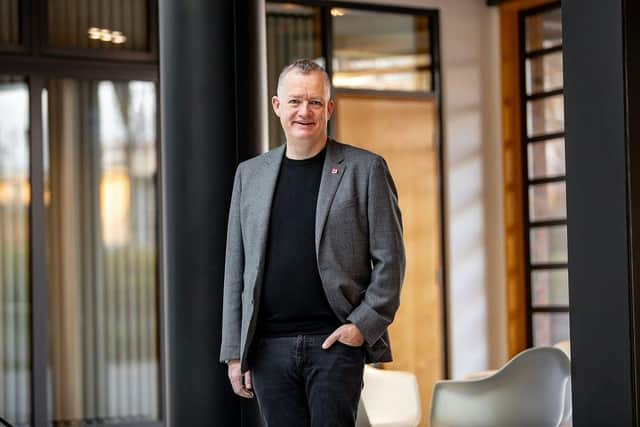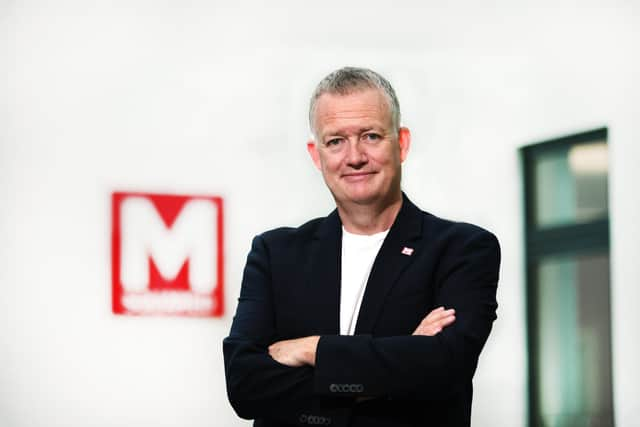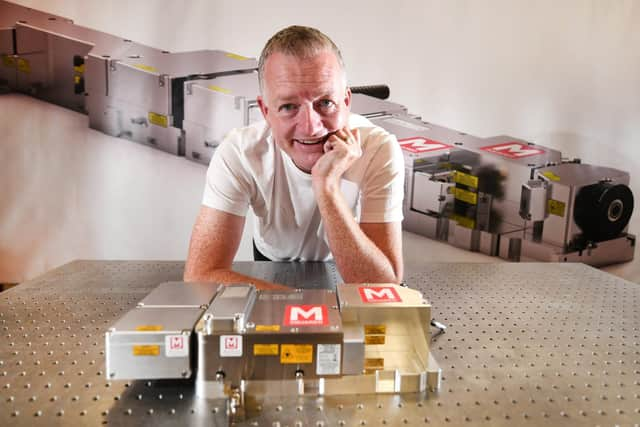Interview: Dr Graeme Malcolm, founder and CEO of Glasgow-based M Squared Lasers
“In science, they often say we stand on the shoulders of giants,” says Dr Graeme Malcolm, co-founder and chief executive of photonics and quantum technology company M Squared Lasers that is based in the West of Scotland Science Park in Glasgow. The firm, which is aiming to “harness the power of light to change the world”, and has racked up many milestones and accolades to date including two Queen’s Award for Enterprise honours, is in its operations acknowledging those that paved the way for its success.
For example, its quantum computing system is named Maxwell, taking after Scottish physicist James Clerk Maxwell who is credited with coming up with the theory of electromagnetics. Albert Einstein said his theories were “the most profound and the most fruitful that physics has experienced since the time of Newton”. And they underpin M Squared’s light sources, which in turn underpin its ability to make its quantum processes work, says Malcolm. Maxwell, billed as the UK’s first commercial neutral atom quantum computing system, runs “on a daily basis with little bits of magic in it that seem like science fiction, even to us, who are trained in this technology”, he adds.
Advertisement
Hide AdAdvertisement
Hide AdHe along with Dr Gareth Maker founded the firm in 2006, its name incorporating the date on which it was established (May 2), the initials of their surnames, and the formula for the multiplication factor in a laser beam’s propagation. Malcolm’s path to that moment can be traced back to his schooldays, when he had a “great” physics teacher and got a summer job at Barr & Stroud, which had supplied binoculars to the Admiralty, and where his next door neighbour also worked. At that time, laser technology “felt like the future – and I wanted to be involved in something that was future looking”.


He studied laser physics and what is now called quantum technologies, getting his PhD, and now explains quantum as harnessing the quantum mechanics of electrons inside atoms after cooling them with a laser to make devices like computers or accelerometers for navigation or gravity.
And Malcolm sees fusing quantum with computing as having huge potential. For example, if you were trying to invent a new fertiliser better than the ammonia-based version using the groundbreaking Haber-Bosch process, it’s estimated that it would take 800,000 years of computer power, but using quantum computing it would only take a few millionths of a second. “We can enable a whole range of new quantum-enabled technologies that can help put the world back on track in terms of net zero,” he says.
Eyeing increased sustainability of “all aspects of life, from energy to food supply to telecommunications, there’s a kind of expectation that these new things that quantum brings will create a whole range of new possibilities”. And amid broader efforts he points out to ensure such tech is well-regulated and used ethically, it is gaining momentum with, say, the UK Government’s £2.5 billion National Quantum Strategy announced last year to make the country “a leading quantum-enabled economy by 2033”.
Quantum is one of M Squared’s remits, also comprising biophotonics and chemical sensing, and its products are used in sectors including advanced manufacturing, making chips for computers or cell phones, oil and gas research, and the medical sector, where cross-sector partnerships have led to breakthroughs in, say, dementia research and cancer diagnosis.


It is also involved in space technology, something Malcolm says will be a key growth area, and will accelerate momentum in Europe (it has opened a German office) and North America, amid 90 per cent of all its products being exported. It works with the European Space Agency on several missions focused on climate change, with its lasers facilitating the collection of data on the planet's atmosphere to track pollutants, and in 2021 it announced a “significant” agreement with European satellite manufacturer Thales Alenia Space.
The Glaswegian firm currently has 80 staff, down from 120 about four years ago, while turnover remains at about £20 million after much investment in quantum computing. Last year, it was among 26 projects given a share of £100m Levelling Up funding to accelerate innovation, with Glasgow one of the three beneficiary high-potential innovation clusters. Susan Aitken, Glasgow City Council leader, said at the time that the city “has a remarkable history rooted in industry and innovation and is home to world-leading science and technology expertise”.
M Squared also holds the title of the Scottish National Investment Bank's first investment in 2020 with £12.5m in growth capital, bolstered by a £20m debt facility provided by Santander UK, and has been backed by Scottish Enterprise and investment fund BGF. Its CEO has also picked up an OBE, but while he welcomes such accolades, the thing that he and the team get the greatest buzz from is the prospect of getting the firm’s technologies “out into the real world, solving real problems, and to both contribute [to that], but also grow our organisation as that happens”.
Advertisement
Hide AdAdvertisement
Hide AdAnd as it targets scaling and commercialisation of new technologies, also seeing great potential to drive efficiencies in the logistics sector, he is also keen for the firm, whose work in quantum technologies he says “stands on the shoulders of” great work carried out in the field of optical technologies in Edinburgh and Glasgow, to help boost its sector in Scotland.


Photonics is now “over a billion pound contributor to the Scottish economy”, he points out. “In Glasgow, Scotland, the UK in general, I think we've got a huge amount to offer here. And that can create a lot of growth, future jobs and economic prosperity.” Malcolm also wants his company’s Glasgow hometown to become synonymous with the quantum industry. “We've gone from the days where you think about things like shipbuilding, to building satellites now, so I think quantum could be the next step on that journey – with M Squared right the middle of that.”
Comments
Want to join the conversation? Please or to comment on this article.